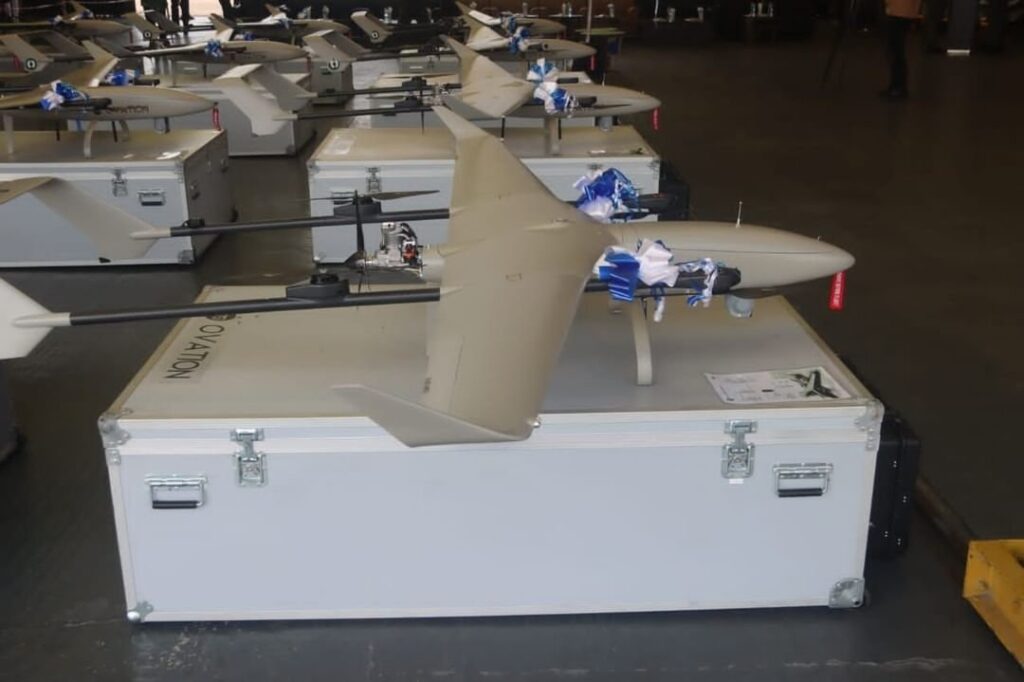ADF STAFF
The kidnapping of crew members from a tanker ship traveling between Côte d’Ivoire and Cameroon on January 1, 2024, is a stark reminder that piracy remains a concern in the Gulf of Guinea. In response, the Nigerian Navy has added to its arsenal of ship-based drones to help monitor coastal waters.
“In an era where the nature of warfare is evolving rapidly, embracing cutting-edge technologies becomes imperative for enhancing our national security,” Vice Adm. Emmanuel Ogalla, chief of naval staff (CNS), said during a recent ceremony inaugurating 12 British-made Ovation unmanned aerial vehicles (UAV) by Comstrac Systems.
Ogalla said the drones will expand the Navy’s capability to support surface vessels and monitor offshore activity.
As part of its anti-piracy Deep Blue Project, the Nigerian Navy has added other drones to its fleet in recent years. The drones provide surveillance, gather intelligence, relay communications and can carry out precision strikes on designated targets.
After declining sharply from 2020 to 2022, piracy has begun to grow again along the coast of West and Central Africa. From Angola to Senegal, international shipping companies have reported an increase in attacks. The United Nations estimates that piracy in the Gulf of Guinea costs nearly $2 billion a year.
The International Chamber of Commerce’s International Maritime Bureau (IMB) reported 21 piracy-related incidents in the Gulf of Guinea in the first nine months of 2023, compared to 14 incidents during the same period in 2022. During those attacks 54 crew members were taken hostage, 14 were kidnapped and two were injured.
Some attackers, such as those off the coast of Angola on January 3, 2024, board the vessel to rob it. More often, however, the goal is holding crew members for ransom. Such was the case on New Year’s Day when pirates attacked a tanker off the coast of Equatorial Guinea and kidnapped nine crew members, including the captain.
The increase prompted the IMB to warn shipping companies in 2023 to take greater precautions while traveling through the Gulf of Guinea, which accounts for 95% of all kidnappings at sea.
“The Gulf of Guinea stands as a region of concern with a rise in reported incidents, as opposed to the downward trend we have seen in the past two years,” IMB Director Michael Howlett said in an October 2023 statement. “The IMB sees regional ownership as critical to safeguard shipping and trade and to address these crimes.”
With one of Africa’s largest blue water navies, Nigeria has taken the lead on confronting piracy in the Gulf of Guinea, a busy international shipping lane.
Every day, about 1,500 vessels transit the 11,000-square-kilometer gulf. Recent attacks Red Sea shipping attacks has pushed even more ships into the gulf as they travel around Africa rather than use the Suez Canal. Although attacks take place largely between Côte d’Ivoire and the Republic of the Congo, many pirates come from the islands and tidal creeks of Nigeria’s Niger Delta.
International agencies say it is vital for Gulf of Guinea countries to confront piracy if they hope to expand their economies, curtail illegal fishing and focus their militaries on national security.
“The frequency and violence of these attacks has preoccupied navies that could be addressing other maritime security threats,” researchers with Stable Seas, a transnational maritime security research organization, wrote in a 2021 report on the cost of piracy in the Gulf of Guinea.
As piracy has grown in the Gulf of Guinea, pirates have moved farther offshore, making them harder to confront in the open ocean. For the Nigerian Navy, the new drone system provides the technology to take the fight to the pirates.
“These UAVs, with their advanced capabilities and versatility, will undoubtedly enhance our naval surveillance for furtherance of strategic capabilities,” Ogalla said. “I have no doubt that this will rejig the Nigerian Navy towards better service delivery in the maritime domain of our dear country.”

